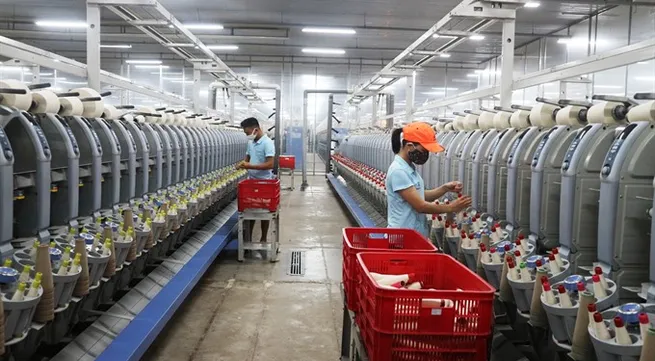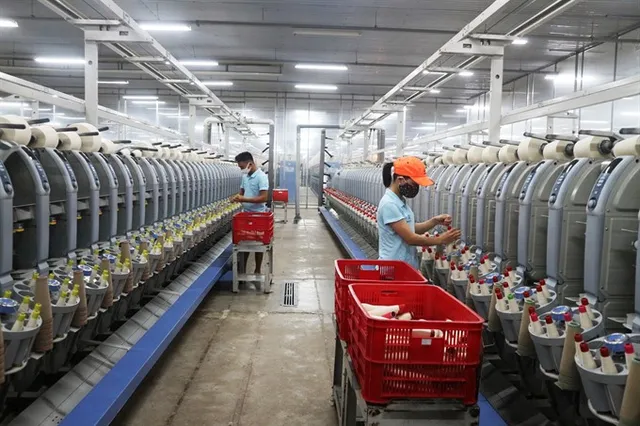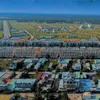Number of firms in Việt Nam surges by over 50%


|
| A production line at Hồng Lĩnh Vinatex Joint Stock Company Fiber Factory in the central province of Hà Tĩnh. |
HÀ NỘI — Nearly 517,900 businesses were operating in Việt Nam in 2017, an increase of 51.6 per cent from the figure recorded in 2012, according to the general economic census announced by the General Statistics Office of Việt Nam (GSO) on September 19.
Despite the strong growth in the number of enterprises, there were just over 10,000 large companies, accounting for a mere 1.9 per cent of the total. The rest were small- and medium-sized firms.
The southeastern region was home to nearly 216,000 businesses, accounting for 41.7 per cent of all companies operating in the country. The GSO said that the results of business operations and production in 2016 were better than in 2011, with net revenue recorded at VNĐ17,850 trillion (US$793.7 billion), 71 per cent higher than that five years earlier.
Net revenue during 2011-2016 surged 11.4 per cent or VNĐ1,400 trillion ($62.2 billion). The non-State business sector had the largest earnings, making up 55.9 per cent of the total net revenue recorded in the business sector.
Head of the GSO’s Industry Statistics Department Phạm Đình Thúy said that the strongest growth in net revenue was seen in FDI enterprises, which expanded 134.5 per cent in 2016 as compared to 2011.
Meanwhile, State-owned firms only contributed 16.7 per cent to net revenue. Return on assets (ROA) of the companies were calculated at 2.7 per cent in 2016, with the highest rate recorded in the FDI sector, 6.9 per cent, followed by State-owned firms with 2.6 per cent and non-State firms with 1.4 per cent.
The industrial and construction sectors reported substantial ROA of 4.8 per cent, while the profitability ratios in the agro-fishery-forestry and service sectors were 2 per cent and 1.6 per cent.
GSO General Director Nguyễn Bích Lâm urged the Government, ministries, sectors and localities to complete institution-building, accelerate the reform of administrative procedures and produce rational measures to remove bottlenecks for enterprises and household businesses.
As economic development in the context of the Fourth Industrial Revolution very much depends on the quality of human resources, Lâm said: “It is necessary for the Government to renew training methods to meet Industry 4.0 requirements”.
Revenue from outsourcing revealed for the first time ever
During the meeting, for the first time ever, the GSO also revealed the revenue that Vietnamese businesses earn from outsourcing goods for foreign producers in 2016, totalling US$8.6 billion.
When outsourcing a product, a firm provides “cut and sew” services, processing or assembling products for the foreign partners, using the materials owned by the foreign companies that contract them.
According to Lâm, in 2016, Việt Nam had 1,740 enterprises conducting outsourcing activities for foreign enterprises. Of these, 1,687 enterprises provided outsourcing services and 52 sent materials abroad for processing.
Major products involved in the outsourcing practice included textiles, footwear, telephones and components, computers and electronic devices and other goods.
Of the total $8.6 billion earned from outsourcing activities in 2016, the revenue of the textile and footwear sector accounted for the largest proportion—48 per cent, with value estimated at $4.1 billion. That of the footwear was $2.7 billion, accounting for 32 per cent. Revenue of telephones and components reached only $268 million, accounting for 3.1 per cent, while that of computers and electronic devices touched $63 million, accounting for 0.7 per cent.
The total value of imported materials used for outsourcing activities reached $20.2 billion, accounting for 11.5 per cent of the total import value of the country. — LV
Tags:





